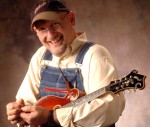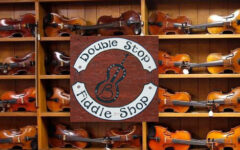
 From October 1, 2010 through to the end of September 2011, we will, each day, celebrate the life of Bill Monroe by sharing information about him and those people who are associated with his life and music career. This information will include births and deaths; recording sessions; single, LP and CD release dates; and other interesting tidbits. Richard F. Thompson is responsible for the research and compilation of this information.
From October 1, 2010 through to the end of September 2011, we will, each day, celebrate the life of Bill Monroe by sharing information about him and those people who are associated with his life and music career. This information will include births and deaths; recording sessions; single, LP and CD release dates; and other interesting tidbits. Richard F. Thompson is responsible for the research and compilation of this information.
So, you thought that I had finished?
As 2011 is not a leap year, there wasn’t any opportunity to record any ‘event’ for February 29.
So, on ……
- February 29, 1956 Mike Compton was born in Meridian, Mississippi, Jimmie Rodgers’ home town.
 Mike Compton, a protégé of the Father of Bluegrass, is considered a modern master of the bluegrass mandolin.
Mike Compton, a protégé of the Father of Bluegrass, is considered a modern master of the bluegrass mandolin.
He helped Bill Monroe during the recording sessions for Butch Robins’ album Grounded, Centered, Focused (Hay Holler Records HHH 108).
The sessions took place on October 28 at Hillsboro High School Vocational Studio, Nashville, and on October 30, 1994 at Top O’ The Hill Recorders, also in Nashville, and Butch Robins and Kerry Hay were the producers.
As Monroe, then 83 years old, tired easily, so Compton assisted Monroe by sitting in front of him and playing along to help Monroe remember the two tunes that they recorded during the first session. Compton also assisted Monroe during the second session.
Early on, Compton was exposed to old time music, through his fiddle-playing father, though it wasn’t until he was 15 years old that he began playing the mandolin.
He moved to Nashville in 1977 where he joined the legendary banjo player Hubert Davis’s band, the Season Travelers, with whom he played for three and a half years and recorded three records.
In 1985 he was recruited by Pat Enright for the Nashville Bluegrass Band and during Compton’s initial stint in the group, from 1985 through to 1988, he appeared on the first four albums that helped to bring the band to international prominence.
After a year working in the Catskill Mountains, he returned to Nashville and began working for John Hartford, which he did up until John’s death in 2001. He was involved in the recording of Hartford’s last half dozen albums.
In 1991 Compton began working with the incomparable guitar player David Grier, touring the US and Japan. The two recorded a duet album, Climbing the Walls, shortly thereafter which was nominated for Album of the Year by the IBMA in 1992.
He re-joined the Nashville Bluegrass Band in the fall of 2000. In addition to being Grammy winners, the group, which has toured extensively around the world, has several IBMA honours.
Mike Compton is the Camp Director at the Bill Monroe-Style Mandolin Camp which takes place annually at the International Bluegrass Music Museum, Owensboro, in September.
Compton shares a profound story, just one that he has from his friendship with Bill Monroe ….
“One night late I found myself sitting at the kitchen table as Bill came in late from the Opry. I had been contemplating asking him a question I had been wanting to ask him for a long time, and it looked like now I would have my chance to talk to him with no one else around.
Upon entering the room, he asked me in an aggressive voice, “What are you doin’ here?” I replied that I was waiting for him. He left the room and shuffled around his bedroom for a while, hung up his overcoat and hat and came back to the kitchen table in a few minutes. We made small talk there in the lamplight for a little while. All the time, in the back of my mind, I was pondering how to ask him my question.
The question I had would be difficult to ask tactfully because it involved Bill’s death and the future of bluegrass without him. Once we came to a place where neither one of us was saying anything, I gathered up my courage and figured it was now or never. Bill sat across the table looking off into space and lightly drumming his fingertips on the table. Here goes…”Bill, what would you tell someone that was wanting to play your music from here on out about how to keep it going and play it in the way you’d like it to be played, say, if you could live forever?
Awkward…but at least I didn’t say anything about death. Bill continued drumming his fingers on the table and looking off. After what seemed like eternity, he said something along the lines of, “You’d have to get in there and really work hard and study it hard and really listen to it and get you some folks to help you, like a fiddle man and a banjo man and a guitar man and a bass man, and get in there with you and really work at it together and listen to it and let it tell you where you should really go, and like that, you know.”
I sat there with the proverbial ‘Lassie look’ waiting for the next lines that never came, the secrets to Monroe style bluegrass mandolin that he had never told. They never came. What did come was more finger-drumming and a barely perceptible smile from one side of his mouth. I didn’t know whether to feel privileged or pissed. So much for my big chance to have the secrets of the bluegrass universe divulged in private.
I knew that Bill had a strange way of speaking the truth and I wondered what worth there was in what he had just said, if there was any, or had it just been nonsensical words to avoid a poorly-worded question that related to the dream of a young man who didn’t really know what he wanted to ask. It took a while, but it dawned on me eventually that he had indeed spoken the truth…work at it (like he did; lesson number one), listen to it, let the music tell me what to do and get like-minded people to play it with me. That was what carrying the music forward, the torch if you will, was all about. All the information I really needed was there before me, but I didn’t see it because I was looking for words that I could label as profound. I wasn’t seeing the forest for the trees.”







